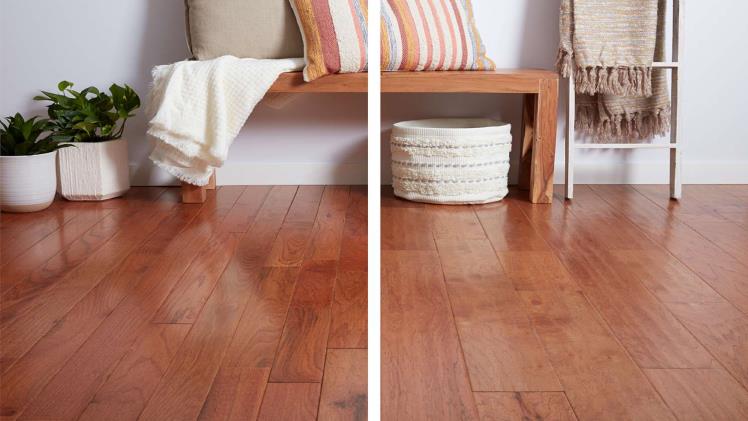When it comes to choosing the perfect flooring for your home, there are numerous options available, but two of the most popular choices are hardwood and engineered flooring. Both offer distinct advantages and come with their own set of considerations. In this blog, we’ll delve into the characteristics of each type of flooring to help you make an informed decision for your space.
Understanding Hardwood Flooring
Hardwood flooring is a timeless option that has been used in homes for centuries. It is made from solid wood planks cut from a single piece of timber, typically hardwood species such as oak, maple, or cherry. Hardwood floors exude natural beauty and warmth, adding elegance and sophistication to any room.
One of the primary advantages of hardwood flooring is its durability. When properly maintained, hardwood floors can last for decades, even centuries, making them a long-term investment for your home. Hardwood floors can be sanded and refinished multiple times, allowing you to refresh their appearance and extend their lifespan.
Another benefit of hardwood flooring is its versatility in design. With a wide range of wood species, stains, and finishes available, you can customize your hardwood floors to complement any interior style, from traditional to contemporary. Whether you prefer the rich tones of walnut or the classic look of oak, hardwood flooring offers endless design possibilities.
However, hardwood flooring has some drawbacks that should be considered. One of the main concerns is its susceptibility to moisture and temperature fluctuations. Solid hardwood is prone to expanding and contracting with changes in humidity, which can lead to gaps between the planks or even warping over time. As a result, hardwood flooring may not be suitable for areas with high moisture levels, such as bathrooms or basements.
Additionally, hardwood flooring can be more expensive than other types of flooring, both in terms of materials and installation costs. The price of hardwood floors can vary depending on the species of wood, the quality of the planks, and any additional features such as hand-scraped textures or wide plank widths. While hardwood flooring is an investment in the value of your home, it may not be the most budget-friendly option for every homeowner.
Exploring Engineered Flooring
Engineered flooring is a relatively newer option that has recently gained popularity. Unlike hardwood flooring, which is made from solid wood planks, engineered flooring consists of multiple layers of wood veneer bonded together with adhesives. The top layer is typically made from hardwood, while the lower layers are composed of plywood or fiberboard.
One key advantage of engineered flooring is its stability. Because it is constructed with multiple layers, it is less susceptible to expansion and contraction caused by changes in humidity and temperature. This makes it an ideal choice for areas with fluctuating environmental conditions, such as basements or kitchens.
Another benefit of engineered flooring is its versatility in installation. Engineered planks can be installed using a variety of methods, including floating, glue-down, or nail-down techniques. This flexibility allows for easier installation over different types of subfloors, including concrete or radiant heating systems.
In terms of aesthetics, engineered flooring offers the same natural beauty as hardwood flooring. Since the top layer is made from real hardwood, engineered floors have the same rich colors, grains, and textures as solid wood planks. With technological advancements, engineered flooring can even replicate the look of exotic hardwood species at a fraction of the cost.
Additionally, engineered flooring tends to be more budget-friendly than solid hardwood. While the initial cost of engineered flooring may be slightly higher than other types of flooring, such as laminate or vinyl, it is often more affordable than solid hardwood. This makes engineered flooring a practical choice for homeowners who want the look of hardwood without breaking the bank.
However, there are some considerations to keep in mind when choosing engineered flooring. While it is more moisture-resistant than solid hardwood, engineered flooring can still be damaged by standing water or excessive moisture. It is important to clean up spills promptly and avoid installing engineered flooring in areas prone to flooding or high humidity.
Furthermore, not all engineered flooring is created equal. The quality of the materials and construction can vary between manufacturers, so choosing a reputable brand with a proven track record of durability and performance is essential. Investing in high-quality engineered flooring will ensure that your floors stand the test of time and maintain their beauty for years to come.
Making the Right Choice
In the debate between hardwood and engineered flooring, there is no clear winner. Both options offer unique benefits and considerations that should be weighed based on your specific needs and preferences. Hardwood flooring provides timeless beauty, durability, and customization options, while engineered flooring offers enhanced stability, versatility, and affordability.
Ultimately, the decision between hardwood and engineered flooring depends on factors such as budget, lifestyle, and environmental conditions. If you prioritize traditional elegance and are willing to invest in long-term durability, hardwood flooring may be the right choice for you. On the other hand, if you seek a practical and budget-friendly option that can withstand moisture and temperature fluctuations, engineered flooring may be the better fit for your home.
Regardless of which type of flooring you choose, hardwood and engineered flooring can enhance your home’s aesthetic appeal and value. By carefully considering your options and consulting with flooring experts, you can make an informed decision that ensures years of enjoyment and satisfaction with your new floors.

